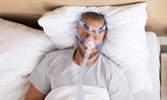Sleep apnea and CPAP therapy are often misunderstood and there are many myths and misconceptions surrounding the topic of sleep apnea. Today, we will debunk those myths and shed light on the truth about sleep apnea and CPAP therapy. Continue reading to find out more!
Myth #1: Sleep Apnea Doesn’t Affect Young People
- This is a common misconception, and many believe that sleep apnea only affects older people. The truth is that sleep apnea can affect anyone at any age, even children.
Myth #2: Sleep Apnea Isn’t Serious and Doesn’t Require Treatment
- Many believe that sleep apnea is harmless and can just be an annoyance, but this isn’t true at all. Sleep apnea is a serious health condition, and if left untreated, can lead to other serious health problems such as high blood pressure, heart disease, and diabetes. Along with the high risk of developing other health conditions, untreated sleep apnea can affect your everyday life by causing excessive daytime sleepiness, poor concentration, and mood changes.
Myth #3: If You Snore, You Definitely Have Sleep Apnea
- This is the most common misconception about sleep apnea, many individuals believe that if you snore, you must have sleep apnea. While snoring is a symptom of sleep apnea, snoring can also be caused by many other factors such as alcohol consumption and allergies. There are many other sleep apnea symptoms other than snoring such as morning headaches and pauses in breathing while asleep.
Myth #4: CPAP Therapy Is Uncomfortable
- While using a CPAP machine does take time to get used to, it is not uncomfortable or claustrophobic. There are a variety of mask sizes and styles available for CPAP users to find one that fits them comfortably. Today, CPAP machines are generally quiet and non-disruptive to allow the user to get the best sleep possible.
Myth #5: CPAP Therapy Cures Sleep Apnea
- Many individuals believe that CPAP therapy will cure their sleep apnea, but this is not true. CPAP therapy can reduce sleep apnea symptoms and helps the user improve their quality of sleep and reduces the risk of developing further health conditions associated with sleep apnea. Continuous use of CPAP therapy is essential in reducing sleep apnea symptoms.
Sleep apnea is a very common condition that affects the lives of many individuals. With the help of CPAP therapy, sleep apnea symptoms can be reduced, and the quality of sleep can be increased. At PulseAir, we can help you take back control of your sleep! Visit our website to find out more about our sleep testing and sleep apnea treatment services. If you have any questions, please reach out to our team!


